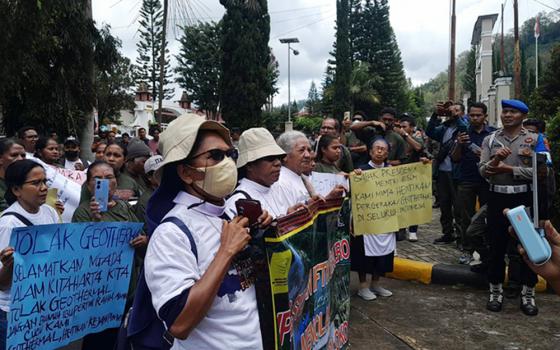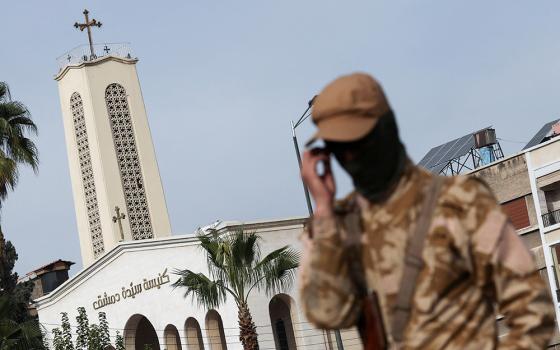By JOHN L. ALLEN JR.
Rome
In the White House and other major global institutions, daily press briefings are as routine as opening the mail and turning on the lights. Not so at the Vatican, where, in the ordinary course of affairs, journalists who cover the place can sometimes go long stretches without even laying eyes on the official spokesperson, Jesuit Fr. Federico Lombardi.
Yet since the Vatican leaks scandal reached a crescendo on May 25 with the arrest of the pope’s butler, Lombardi has been channeling Jay Carney, offering briefings on a daily basis – sometimes to update the judicial process against Paolo Gabriele, the butler, though more often to deny whatever rumors and speculation popped up in the Italian papers that morning.
That was the case again on Monday, when Lombardi convened reporters for roughly a half-hour session.
Lombardi began by expressing “sorrow” over the latest attacks in Nigeria on Christian churches by the militant Islamic sect Boko Haram, calling the events “sad and dramatic” and expressing “closeness” to Nigeria.
On the judicial investigation of Gabriele, Lombardi told reporters that the formal interrogation of the butler remains on hold, and is not likely to be resumed anytime soon, at least not “in the next few days.”
“But that does not mean nothing is happening,” Lombardi insisted, saying that investigators are continuing their review, including studying documents reportedly seized during a search of Gabriele’s apartment, in order to get “a better defined and complete picture of the situation.”
Vatican magistrates are determined “to proceed with calm,” Lombardi said, and to act “with seriousness.”
Lombardi added that Gabriele was allowed to go to Mass on Sunday as normal, and continues to have regular access to his lawyers, members of his family, and to a priest providing spiritual counsel.
In what has become a regular feature of these briefings, Lombardi then produced a number of articles in the Italian media to which he objected. This time around, he pointed to articles by three different news outlets which, he said, “use practically the same words” – raising the question, Lombardi said, of whether they “had a source in common” or were simply “copying one another.”
The common denominator, he said, was the assertion that “at least two cardinals” are under investigation as possible sources of the leaks, as well as “four or five laity, including a journalist.”
“I’m not aware” of any cardinals being the target of an investigation, Lombardi said.
“I cannot confirm these numbers, and I invite prudence in using them as a point of reference,” the spokesperson said.
Lombardi also objected to reports in the Italian press that the Vatican has “rejected,” or at least “not responded,” to a request for collaboration put forward by a prosecutor in Sicily investigating fraud charges related to the disappearance of $1.2 million from two charitable foundations operated by the Trapani diocese. The pope recently sacked Bishop Francesco Miccichè of Trapani over the scandal.
Contrary to the recent reports, Lombardi said, a formal request for collaboration had only reached the Vatican through diplomatic channels on May 9, meaning one month ago.
“The Secretariat of State received it, and forwarded it to the Vatican tribunal. We are in the process of responding to it, in a friendly spirit, within an absolutely normal period of time for these things,” Lombardi said.
Bottom line: According to Lombardi, the Vatican has never failed to respond to requests for collaboration by Italian authorities, despite repeated claims to the contrary, which have fueled perceptions in Italy of Vatican “arrogance” and a sense that it’s above the law.
“Whether or somebody likes the answer, or is completely satisfied with it, is another matter,” Lombardi said, “but it’s not true that requests have been received without any response.”
Lombardi added that so far, the Vatican has not made any formal request of its own for help from Italian authorities in its investigation of the leaks scandal.
A reporter asked Lombardi if a new president of the Vatican Bank, to replace the recently ousted Ettore Gotti Tedeschi, will be named before July 2, when an agency of the European Commission is expected to rule on whether the Vatican qualifies for its anti-money laundering “white list.”
“I don’t know, and I don’t know that it’s necessary to do so,” Lombardi said. “The elements for the judgment of the evaluators have already been received. They asked for certain materials, and they were sent.”
The timing of the evaluation, he said, “shouldn’t influence the decision.”
In general, Lombardi appeared to play down hopes for an immediately positive result.
“The Vatican is a fairly sui generis reality, not immediately comparable to other states,” he said, “and it wouldn’t stupify me” if the initial response is mixed, and more work has to be done to achieve a verdict of full compliance.
In general, Lombardi said the Vatican’s drive to open itself to an “external, objective evaluation … by secular agencies” is a “very positive,” almost “epochal,” step in the direction of transparency and accountability. He added that if the process eventually ends with certification of compliance, “it would be a great result.”
I asked Lombardi about today’s meeting between officials of the Leadership Conference of Women Religious and the Vatican, and he expressed hope for “reciprocal understanding” to result.
Finally, Nicole Winfield of the Associated Press asked Lombardi to comment on the most recent Vatican leak, which was publication over the weekend of a confidential letter from a psychotherapist expressing concern about Gotti Tedeschi’s mental health.
The psychotherapist had been asked by the Vatican Bank’s director, Paolo Cipriani, to help the institution cope with workplace stress. In a letter written in March and published on Sunday, the psychotherapist expressed concern to Cipriani about Gotti Tedeschi’s stability based on behavior he had observed at a Vatican Bank Christmas party.
Lombardi said he “truly regretted” publication of the letter. However, he didn’t respond to follow-up questions about whether the psychiatrist should have been sharing such information with Cipriani in the first place, given the privacy concerns involved, or whether he would continue working for the Institute for the Works of Religion, popularly known as the “Vatican Bank.”
t


